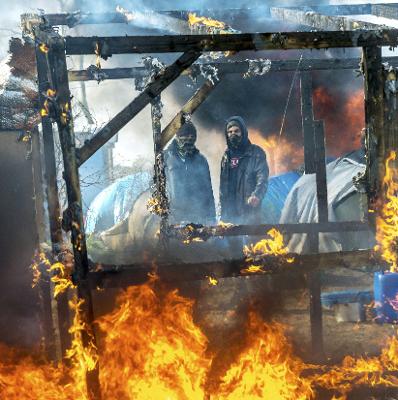Calais at the Edge of Europe: Solidarity Against Borders
In Dunkerque and Calais, at the end of September Ways of Europe will gather voice voices of solidarity to resist Europe’s securitarian policies and affirm dignity, from Calais to Gaza

September has just begun, and as the days carry us toward Autumn, an important gathering approaches for our project. On 29 and 30 September, in Dunkerque and Calais, activists, educators, young people, and citizens from across Europe will come together for Ways of Europe in France. These two days are not simply a conference: it will be a moment of collective reflection on an importan question of our time: how do we, as Europeans, respond to the crises of our time? How do we resist the normalization of borders, camps, and exclusion? How do we reclaim solidarity as a political practice?
The program will begin in Dunkerque, where participants will be welcomed not just with introductions but with the chance to create together through the Radio Workshop: by producing podcasts, participants will explore and amplify stories about just transition, sustainability and migration. Each recording becomes a fragment of a larger narrative: that another Europe is possible, one built on dignity, care and the refusal of invisibility.
But the gathering is not limited to discussion. On the second day, the group will move to Calais, a city that has become a symbol of Europe’s securitarian policies: a place where solidarity networks and humanitarian groups resist, daily, the violence of borders; and at the same time, a laboratory for the EU’s most brutal border experiments. Visiting Auberge des Migrants, participants will not only observe but also contribute: cooking, sorting clothes, preparing food packages. Others will take part in drafting a manifesto, a political statement that arises from the lived reality of the border.
This is not neutral ground. To meet in Calais is to stand in the midst of a European fault line. Here, questions of migration are immediate matters of survival, of human dignity, of the right to move and to live. To write a manifesto in Calais means to confront the ways in which the European Union, by investing in fences, surveillance, and militarized policing, has chosen control over compassion. It means acknowledging that, as bombs keeps on falling on Gaza and a genocide unfolds in front of the world’s eyes, Europe continues to entrench a politics of silence and complicity. The logics that allow entire populations to be dehumanized and besieged are the same logics that allow refugees at our borders to be left in the cold, without shelter, hunted by police patrols.
This conference asks participants (and all of us) to recognize the deep political implications of solidarity. To stand with migrants in Calais is also to stand with Palestinians in Gaza, with displaced people in Sudan, with those excluded from the promise of Europe. Solidarity here means resistance, insisting that securitarian politics are not inevitable. That Europe can be something other than walls and barbed wire.
By the end of these two days, the restitution session will gather voices, stories, and commitments into a shared space. It will not be a conclusion, but a beginning. A reminder that culture, storytelling, and grassroots action can challenge dominant narratives and inspire political imagination.
Ways of Europe in France is thus not a closed event but part of a wider movement. By bringing people together in Dunkerque and Calais, it continues a journey already traced in other borderlands: we've already been in Lampedusa, we'll go onwards to Barcelona and Budapest. Each stop adds a new layer to a collective project, one that believes Europe must be remade from below, with those who are most affected at the center.
At a time when walls are rising and authoritarianism is gaining ground, this gathering calls us to a different horizon: a Europe of welcome, of justice, of solidarity strong enough to oppose violence both within and beyond our borders. Because to remain silent, in Calais or in Gaza, is to accept the unacceptable. And to resist together is to begin to change the story of Europe itself.


